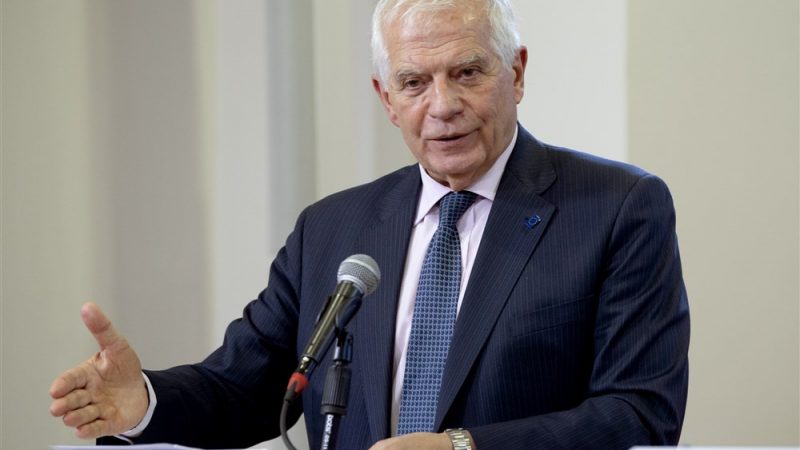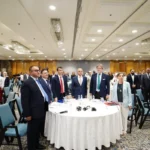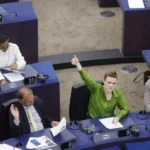EU foreign policy chief Josep Borrell warned on Sunday (March 26) that the EU was “ready” to adopt new sanctions against Belarus if that country deployed Russian nuclear weapons on its territory.
“Belarus’ hosting of Russian nuclear weapons would be an irresponsible escalation and a threat to European security. Belarus can still stop this, it’s their choice. The EU stands ready to react with new sanctions,” Josep Borrell said on Twitter.
Russian President Vladimir Putin said on Saturday (March 25) that Moscow would deploy “tactical” nuclear weapons on the territory of its ally, Belarus, a country located on the doorstep of the European Union.
“Russia’s nuclear rhetoric is dangerous and irresponsible,” NATO said on Sunday.
“NATO is vigilant and we are monitoring the situation closely,” Alliance spokeswoman Oana Lungescu said. “We have not seen any changes in Russia’s nuclear posture that would cause us to adjust ours,” she said.
Russian officials have repeatedly issued thinly veiled threats to use nuclear weapons in Ukraine if the conflict escalates significantly. Led since 1994 by Alexander Lukashenko, Belarus borders Ukraine, Poland and Lithuania.
The EU announced at the end of February the extension of its sanctions against Belarus for one year because of the repression carried out by the regime of Alexander Lukashenko and its support for the war led by Russia in Ukraine.
President Alexander Lukashenko and 194 other figures close to the regime have been banned from the EU and their assets have been frozen.
In addition, 34 entities have been sanctioned and all European funding is prohibited.
Belarus is also subject to targeted economic sanctions, including restrictions in the financial sector, trade, dual-use goods, telecommunications, energy, transport.
Vladimir Putin justified the deployment of nuclear weapons in Belarus by the deployments of American weapons in Europe.
“There is nothing unusual here: the United States has been doing this for decades. They have long been deploying their tactical nuclear weapons on the territory of their allies,” the Russian president said. “We agreed to do the same,” he added, adding that he had the Minsk agreement.
“Russia’s reference to NATO nuclear sharing is totally misleading. NATO allies act in full respect of their international commitments. Russia has continued to violate its arms control commitments, recently suspending its participation in the new START treaty, ”reacted the NATO spokeswoman.
“Russia must return to respecting its commitments and act in good faith,” added Oana Lungescu.
Taken Hostage
Last February, Russia used Belarus as a staging ground to send troops to Ukraine as part of Vladimir Putin’s invasion of the country.
Since then, Moscow and Minsk have maintained close military ties, while the Kremlin continues its war against Ukraine.
Oleksiy Danilov, secretary of Ukraine’s National Security and Defense Council, accused Russia of “taking Belarus nuclear hostage” in a tweet posted on Sunday.
The Ukrainian Foreign Ministry accused Russia of failing to fulfill its obligations and undermining “the architecture of nuclear disarmament and the international security system in general”.
“Ukraine expects the United Kingdom, China, the United States and France to take effective measures to counter the Kremlin’s nuclear blackmail. We demand that an extraordinary meeting of the UN Security Council be immediately convened for this purpose,” Ukraine said in a statement.
She called on “ all members of the international community to inform Mr. Putin’s criminal regime of the categorical unacceptability of his latest nuclear provocations ”.
The Nuclear Risk
The most optimistic Russian politicians and commentators have long speculated about possible nuclear strikes against Western countries, saying Russia has the right to defend itself with nuclear weapons if pushed beyond its limits.
It is unclear how many nuclear weapons Moscow has. Although the Kremlin has never publicly confirmed it, the West has long claimed that Russia maintains nuclear-capable missiles in Kaliningrad, its Baltic coast enclave between NATO-member Poland and Lithuania. of the European Union.
Mr. Putin’s statements on Sunday also do not make it possible to know where the weapons would be stationed in Belarus. However, military experts agree that the transfer would increase Russia’s nuclear strike capability along NATO’s eastern border.
Earlier on Friday (March 24), Borrell told reporters that Chinese President Xi Jinping’s recent trip to Moscow had reduced the chances of Putin using nuclear weapons.
“An important thing is that this visit reduces the risk of nuclear war, and they [the Chinese] have said that very, very clearly,” Borrell said.
“Xi [Jinping] wants to minimize the risk of being associated with Russian military intervention,” he added. “ They are not engaged militarily and there is no indication that they wish to engage militarily. »
This article is originally published on euractiv.fr







